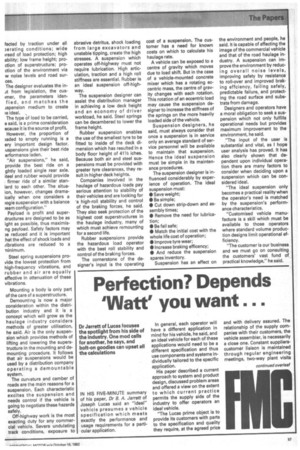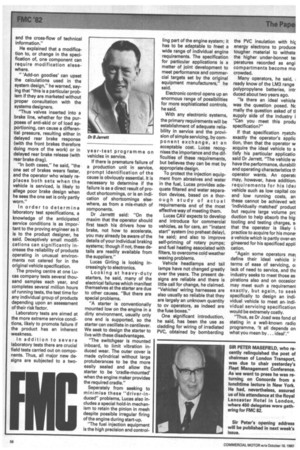Perfection? Depends 'Watt' you want. .
Page 35

Page 36

If you've noticed an error in this article please click here to report it so we can fix it.
Dr Jarrett of Lucas focuses the spotlight from his side of the industry. One mod calls for another, he says, and bolt-on goodies can upset all the calculations IN HIS FIVE-MINUTE summary of his paper, Dr B. A. Jarrett of Joseph Lucas said an "ideal" vehicle presumes a vehicle specification which meets exactly the performance and usage requirements for a particular application. In general, each operator will have a different application in mind for his vehicle, he said, and an ideal vehicle for each of these applications would need to be a different specification and thus use components and systems individually tailored to the specific application. His paper described a current approach to system and product design, discussed problem areas and offered a view on the extent to which current practice permits the supply side of the industry to offer operators an ideal vehicle.
"The Lucas prime object is to provide its customers with parts to the specification and quality they require, at the agreed price and with delivery assured. The relationship of the supply companies with their customers, the vehicle assembler, is necessarily a close one. Constant supplierscustomer liaison is maintained through regular engineering meetings, two-way plant visits and the cross-flow of technical information."
He explained that a modification to, or change in the specification of, one component can require modification elesewhere.
"'Add-on goodies' can upset the calculations used in the system design," he warned, saying that "this is a particular problem if they are marketed without proper consultation with the systems designers.
"Thus valves inserted into a brake line, whether for the purposes of anti-skid or of load apportioning, can cause a differential pressure, resulting either in delayed rear brake response (with the front brakes therefore doing more of the work) or in delayed rear brake release (with rear brake drag).
"In both cases," he said, "the one set of brakes wears faster, and the operator who wisely replaces both sets when the vehicle is serviced, is likely to allege poor brake design when he sees the one set is only partly worn."
In order to determine laboratory test specifications, a knowledge of the anticipated service conditions is as important to the proving engineer as it is to the product designer, he said. Deceptively small modifications can significantly increase the reliability of products operating in unusual environments not catered for in the original vehicle specification.
The proving centre at one Lucas company tests several thousand samples each year, and completes several million hours of running tests, the test time for any individual group of products depending upon an assessment of their risk factor.
Laboratory tests are aimed at the more extreme service conditions, likely to promote failure if the product has an inherent weakness.
In addition to severe laboratory tests there are crucial field tests carried out on components. Thus, all major new designs are subjected to a two year-test programme on vehicles in service.
If there is premature failure of a production unit in service, prompt identification of the cause is obviously essential. It is necessary to determine if the failure is as a direct result of product shortcomings, or is an indication of shortcomings elsewhere, as from a mis-match of components.
Dr Jarrettt said: "On the maxim that the operator should first teach his drivers how to brake, not how to accelerate, you may already be aware of the details of your individual braking systems; though if not, these details are readily available from the suppliers."
Lucas Girling is looking increasingly to electronics.
Looking at heavy-duty starters, he said, many of the electrical failures which manifest themselves at the starter are due to other causes. "But there are special problems.
"A starter is conventionally mounted low on the engine in a dirty environment, usually only one end is supported, so the starter can oscillate in cantilever. We seek to design the starter to live with these disadvantages.
"The switchgear is mounted inboard, to limit vibration induced wear. The outer cover is made cylindrical without large protuberances to be the more easily sealed and allow the starter to be 'cradle-mounted' when the engine maker provides the required cradle."
Seperately from seeking to minimise these "driver-induced" problems, Lucas also includes a special hold-in mechanism to retain the pinion in mesh despite possible irregular firing of the engine during start-up.
"The fuel injection equipment is the high precision and control ling part of the engine system; it has to be adaptable to Meet a wide range of individual engine requirements. The specification for particular applications is a matter of joint development to meet performance and commercial targets set by the original equipment manufacturers," he said.
Electronic control opens up an enormous range of possibilities for more sophisticated controls, he said.
With any electronic systems, the primary requirements will be establishment of adequate reliability in service and the provision of simple servicing, by component exchange, at an acceptable cost. Lucas recognises the importance and the difficulties of these requirements, but believes they can be met by appropriate design.
To protect the injection equipment from abrasives and water in the fuel, Lucas provides adequate filtered and water separation devices, based on a thorough study of actual requirements and of the most effective way of meeting them.
Lucas CAV expects to develop and introduce for commercial vehicles, as for cars, an "instant start" system (no preheat delay), he said; and also to improve self-priming of rotary pumps; and fuel heating associated with filters, to overcome cold weather waxing problems.
Vehicle headlamps and tail lamps have not changed greatly over the years. The present designs are reliable and there is little call for change, he claimed. "Vehicles' wiring harnesses are also usually so reliable that they are largely an unknown quantity to cv operators, as indeed are the fuse boxes."
One significant introduction, he said, has been the use as cladding for wiring of irradiated PVC, obtained by bombarding the PVC insulation with hic energy electrons to produce tougher material to withsta the higher under-bonnet tei peratures recorded as engi compartments become mo crowded.
Many operators, he said, ready know of the LM3 range polypropylene batteries, intr duced about two years ago.
"Is there an ideal vehicle was the question posed. f■Ic mally the question asked of tl supply side of the industry i "Can you meet this produ specification?"
If that specification match exactly the operator's applic tion, then that the operator w acquire the ideal vehicle to s. tisfy his particular applicatioi said Dr Jarrett. "The vehicle w have the performance, durabilit and operating characteristics th operator wants. An operatc may, however, have addition requirements for his idea vehicle such as low capital col and low running costs, an these cannot be achieved wit 'individually matched' product but require large volume prc duction to help absorb the higl tooling and testing charges, si that the operator is likely ii practice to acquire for his mane) a vehicle which is partly over-en gineered for his specificed appli cation.
"Again some operators ma) define their ideal vehicle ir terms of ease of servicing, oi lack of need to service, and thE industry seeks to meet those aspirations also and on occasion may meet such a requirement exactly, but again, to seek specifically to design an individual vehicle to meet anindividual servicing specification would be extremely costly.
"Thus, as Dr Joad was fond of stating in a well-known radio programme, 'It all depends on what you mean by ... ideal'."




















































































